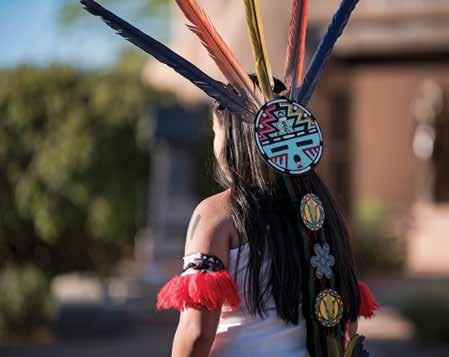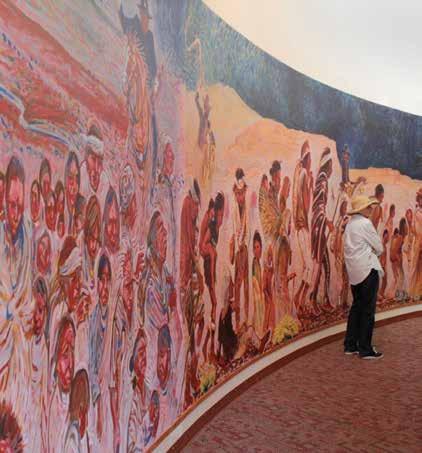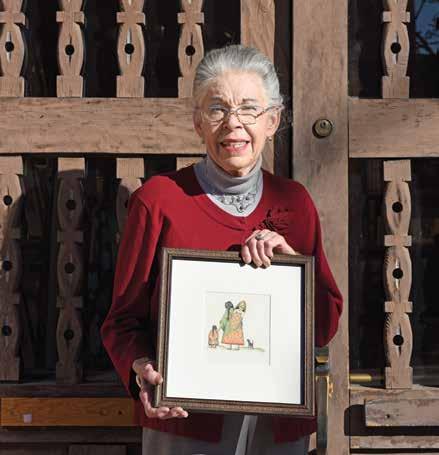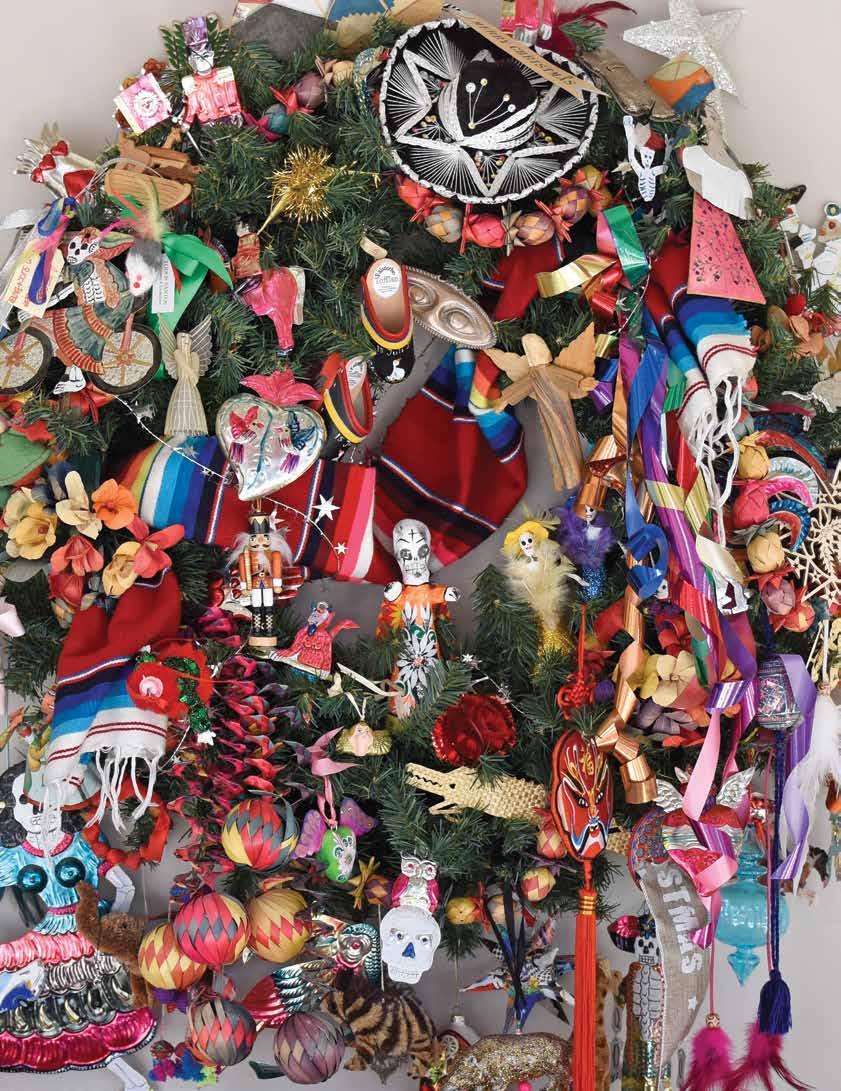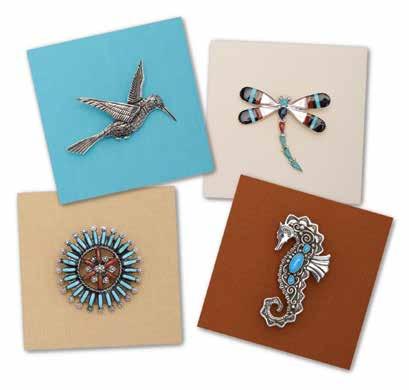
4 minute read
MUSEUM OF INTERNATIONAL FOLK ART
Shop Talk with Christine Jaeger
Museum of International Folk Art Shop Manager
I’ve been the manager for seven years, and whatever is tied to an exhibition always sells best. The Yokai: Ghosts and Demons of Japan exhibition product is great because it goes across all ages. There are fabulous things for little kids, very sophisticated accordion books and crafts.
We get new shipments almost daily. People come in and get the thrill of new treasures.
I do love selling the Alexander Girard product. It’s so fabulous. I love the Girard dolls. Those are so fun to have.
I also love being able to introduce people to a new author or a new topic. So many of our books are about women and immigrants and I love being able to share some stories with people and see their excitement.
In the warmer months, we sell Indian kurtis. People come in asking, “Where are your kurtis?” They buy those in bulk sometimes, because they’re very affordable and perfect for our climate.
The Holiday Pop-Up Shop has been one of the smartest things we’ve done. I’m so proud the Foundation put that together. Literally, we physically moved our shop. We sold in all categories.
The Thrill of Discovery
Shop Offers the Unexpected
It’s easy to see why the Museum of International Folk Art Shop might be Shops buyer Sara Birmingham’s favorite store to curate. Her buying trips have led her to villages near Macchu Picchu, where she looked for handcrafted goods to complement the 2017 exhibition Crafting Memory: The Art of Community in Peru. In 2012, she scoured the Fancy Food Show in San Francisco for specialty chocolates to sell in conjunction with the New World Cuisine exhibition.
For Birmingham and her customers, it’s about the thrill of discovery and an unwavering mission to support artists. Folk Art Shop manager Chris Jaeger says their customers expect the unexpected. “What are customers expecting to find here? Variety, variety, variety. Uniqueness,” she says. “I think people in general love shopping in museum shops for that reason.”
The Folk Art Shop takes merchandising to another level with its thorough selection of objects surrounding exhibition themes. Japan-made ceramics, dolls, toys and books related to the popular Yokai: Ghosts and Demons of Japan exhibition (now extended until 2022) have sold well, including online when the museum shut down due to COVID-19.
“By country, we carry as much as possible that’s tied to exhibitions,” says Jaeger. “We have our African section, we have Peru, we have Mexico, we have South America. When you walk in, what you will see is a variety of different countries. What the customers say about our wide assortment of things is, ‘I can always find something different here. I can always find something for the person who thinks they have everything.’”
Museum executive director Khristaan Villela says the shop is “an extension of our mission.” He adds, “The Folk Art Shop is a destination in and of itself. The quality of goods keep people coming back year after year.”
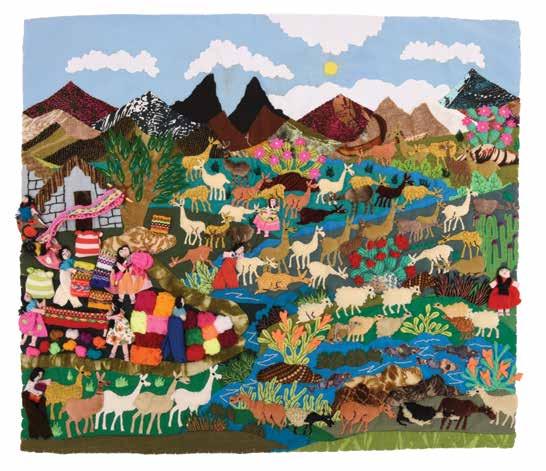

Villela, Jaeger, Birmingham and the museum’s curators all take pride in the shop’s commitment to featuring working artists. “The nature of folk art is that it’s less centralized,” Villela says, which can make it difficult for artists to receive compensation or even recognition for their work. “We feel it’s important that we do everything we can to make sure that the dollars people spend here actually get into the pockets of the artists themselves.”
Villela praises the Museum of New Mexico Foundation’s commitment to not featuring reproductions or other items that may compromise an artist’s agency.
“It’s very important to the team at the Folk Art Museum that part of supporting artists is supporting their intellectual property rights,” he says. “The issue of not buying reproductions and cultural appropriation is a hot one now. We really appreciate that the Shops and Sara [Birmingham] and the Foundation are responsive to feedback around that.”
It’s perhaps no coincidence that the shop logged strong recent sales for Alexander Girard-branded merchandise, a fitting tribute to the man who donated a vast majority of the museum’s collection. The museum’s collaboration with the Vitra Design Museum in Germany and the Girard Studio for the 2019 exhibition Alexander Girard: A Designer’s Universe was the very first time the shop was permitted to sell Girarddesigned merchandise.
Jaeger shares her customers’ enthusiasm for finding unique and unexpected exhibition-inspired items. She especially loves to tell stories that connect her buyers to global artists whose names may not be as well known as Girard’s, but whose products he might have taken home himself.
“Like the embroidered pieces we have from Peru—when people are looking at them, you tell them a little bit about the women making them, and you get a big smile,” she says. “It’s the discovery you share with someone else. They can take it home and love it, or give it to someone else who’s going to love it.”
To support the Museum of International Folk Art, contact Caroline Crupi at Caroline@museumfoundation.org or 505.216.0829.
Opposite: Christine Jaeger, Museum of International Folk Art Shop manager at the Holiday Pop-Up Shop last December. Photo © Saro Calewarts. Above: A handmade Peruvian arpillera (left) and wooden dolls designed by Alexander Girard represent a unique range of folk art products. Left photo © Saro Calewarts. Right photo courtesy Vitra Design Museum.



